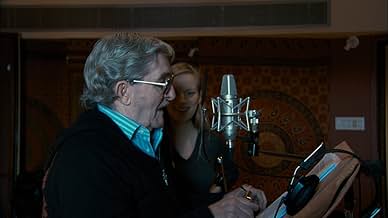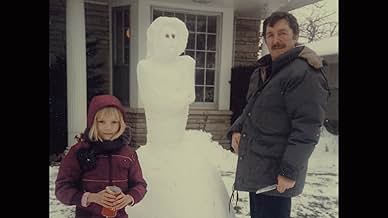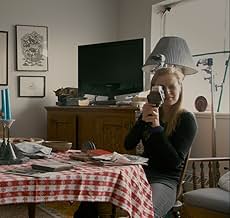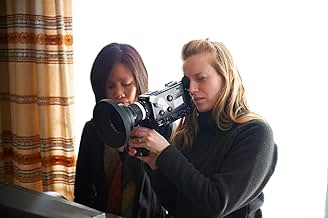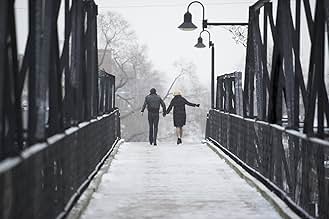Aggiungi una trama nella tua linguaA film that excavates layers of myth and memory to find the elusive truth at the core of a family of storytellers.A film that excavates layers of myth and memory to find the elusive truth at the core of a family of storytellers.A film that excavates layers of myth and memory to find the elusive truth at the core of a family of storytellers.
- Premi
- 25 vittorie e 44 candidature totali
- Self - Storyteller
- (as Geoff Bowes)
Recensioni in evidenza
On this level I liked the film and I thought it worked well, but I have to disagree with the comments made by many in regard what it else it does. Many have praised the film for showing how stories get fragmented and twisted and how perspectives etc influence their telling and indeed Polley herself lays this out as the goal for the film when she is asked towards the end. Perhaps it is because she said it so clearly that some assumed she'd done this and perhaps it is also the reason why it stood out to me that she didn't, even though I liked what she had done with it. The problem with this goal is that, while the story over the past few decades may have been half-told, twisted and gradually revealed with different people knowing or thinking different things, in the film this is not the case at all. Indeed the thing that makes the story so engaging is that it is so well structured to be gradually delivered, be clear and be interesting on its impact on the family. Everyone contributing knows the full story and while they may have different opinions on small things or motivations of others, there really isn't something like Rashomon here where the same thing is different from different angles. There are no questions left, no doubt at any point really – we get introduced, follow the story quickly and efficiently and are left at the end with everything neatly done.
The irony is that for me the film works well like this. I enjoyed the story and how well told it was and I found the contributors to be honest, human and engaging. It is a very personal and human film and this was the quality I took from it. I still had no reason to care about this specific family over any other, but it worked nonetheless. To me it is almost a shame that Polley laid out this alternative goal because she really doesn't get anywhere near achieving it and indeed if she hadn't said anything about it I would never have guessed such an objective was ever on the table.
It works for what it is, but in terms of its own goals it is unsuccessful – but it still worked for me.
Sarah's siblings and family friends begin by talking about Sarah's mother, Diane, who died, aged 55, in 1990, when Sarah was 11 . (There's some actual 8mm footage of the family, intermixed with staged footage that has the same grainy look of old amateur filmmaking.)
Sarah's mother was beautiful, and she was vivacious and fun-loving. Sarah's dad was a handsome, decent person, but no one would describe him as vivacious and fun-loving. The marriage wasn't terrible, but it was clear to the couple--and eventually to their children--that it wasn't a good match.
That much information is established in the first half-hour of the movie. Then the question arises as to whether Sarah's dad is really her biological father. Polley decides to dig for this answer, and interview the same people she's already interviewed, although this time asking the question, "Who's my father?" Polley accumulates information bit by bit, and eventually expands her search to include people who knew Diane when she was performing in a play out of town.
As Sarah embarks on this search, the camera keeps rolling, and we go along at her side. It's a fascinating ride, because everyone has part of the picture, but only two people had the answer, and one of them is no longer alive.
Stories We Tell is a quiet, careful movie. There's anger, but no shouting, sadness, but no tears. Sarah Polley is in the middle of it all, but she's credited as the director, not as the star. In a way, the star of the movie really is the late Diane Polley, but she's the one person who can't tell her side of the story. That's what makes the whole thing so fascinating.
This is a movie you will want to see if you enjoy quiet, thoughtful, serious films. It will work equally well on a small or large screen.
Some true surprises occur during the course of the interviews; STORIES WE TELL goes deep in its own subtle, quiet way. Still, at the risk of sounding like a vulture, I was hoping for some darker--or at least more unusual or startling--revelations. While it's easy to understand why the real substance of the film--I don't want to give away the specifics--is critical stuff for Sarah Polley, it's nothing the average person hasn't seen or read in other works, factual or fictional. STORIES WE TELL also takes too long to show what it has to show. While the multiple perspectives are intriguing, they become ponderous and repetitive after a while.
In any event, this film functions well as a simple yet meaningful think-piece. Those who want a lot of variety, excitement, layers & twists, etc, however, may be a trifle bored by it.
Lo sapevi?
- QuizSarah collected all the stories first. She went through all the period footage she had available. After that, she hired actors to recreate and reenact bits filmed on 8mm to complete the missing period footage. This explains why there is always "proof" of all the raconteurs stories. It works rather as flashbacks to place us in situation.
- Citazioni
Michael Polley - Storyteller: When you're in the middle of a story, it isn't a story at all but rather a confusion, a dark roaring, a blindness, a wreckage of shattered glass and splintered wood, like a house in a whirlwind or else a boat crushed by the icebergs or swept over the rapids, and all aboard are powerless to stop it. It's only afterwards that it becomes anything like a story at all, when you're telling it to yourself or someone else.
- ConnessioniFeatured in At the Movies: Venice Film Festival 2012 (2012)
- Colonne sonoreTranquility
Written by Abraham Lass
From PLAY ME A MOVIE (Folkways Records/AH 3856)
Courtesy of TRF Production Music Libraries and Alpha Music Inc. and Smithsonian Folkways Recordings.
© 1971 Used by permission.
I più visti
- How long is Stories We Tell?Powered by Alexa
Dettagli
- Data di uscita
- Paese di origine
- Siti ufficiali
- Lingua
- Celebre anche come
- Истории, которые мы рассказываем
- Luoghi delle riprese
- Azienda produttrice
- Vedi altri crediti dell’azienda su IMDbPro
Botteghino
- Lordo Stati Uniti e Canada
- 1.600.145 USD
- Fine settimana di apertura Stati Uniti e Canada
- 27.053 USD
- 12 mag 2013
- Lordo in tutto il mondo
- 2.641.053 USD
- Tempo di esecuzione
- 1h 48min(108 min)
- Colore
- Mix di suoni
- Proporzioni
- 1.85 : 1






